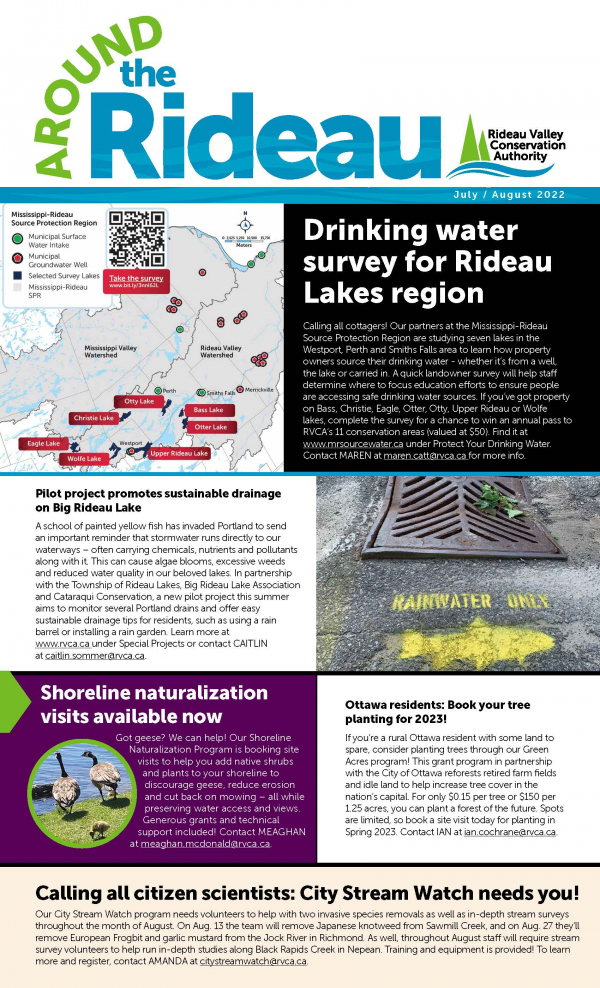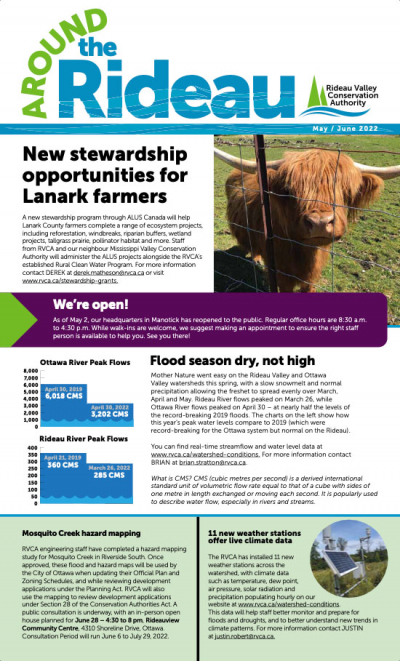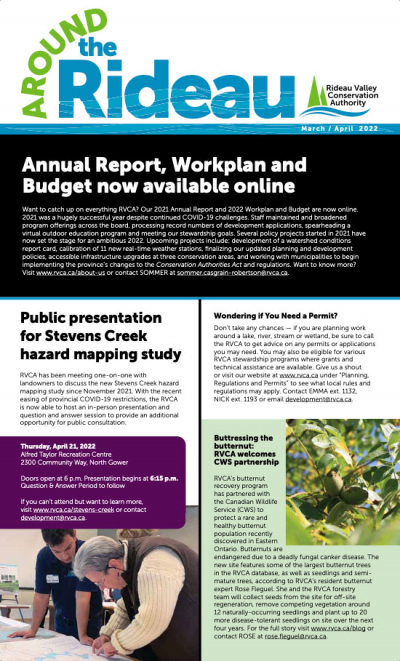
RVCA (1141)
Children categories

Department (66)
Main Office Phone Numbers : 613-692-3571 / 1-800-267-3504
Staff Directory
![]()

How to submit digital paperwork:
- Access all forms and fee information by clicking here.
- Be sure that the application is in PDF format (including photos).
- Consider using apps such as Turbo Scan that convert jpeg photos into PDF documents.
- Upgrading software on office desktop to Adobe Pro to be able to edit PDF documents.
2. Electronic files that accompany the email request/instruction must be applied as an ATTACHMENT.
3. Email your application to the intake email address identified by your municipality listed here.
4. Watch for payment details. Directions on how to make payment will be sent to your inbox. Please note, payments must be received to activate the permitting process.
![]()

When reporting a failing system or other occurrences please contact your local conservation authority. You will need to provide the following information upon calling our office for the property in question:
- Name of Property Owner
- Civic Address (Ex. 3889 Rideau Valley Dr.)
- Municipality
- Complaint (e.g., I can see sewage pooling on my neighbors’ septic bed)
- Are you a neighbour, councillor, or installer? From the Health Unit, By-Law Office or Building Inspector?
Please note all reports are kept confidential
If you would like to receive a response from us ensure you leave contact information otherwise we will treat this as an anonymous report.
![]()

General
NEW BOOKLET: Septic Smart - Understanding your Home's Wastewater System
Septic System/Treatment Units with Annual Maintenance Agreements
Wells
 Township of Rideau Lakes drainage manager Dan Chant joined RVCA intern Caitlin Sommer in Portland this July to paint yellow fish on several storm drains. These fish will remind residents that stormwater goes directly to the lake.The Township of Rideau Lakes has generously funded a pilot partnership with Big Rideau Lake Association, Cataraqui Region Conservation Authority and Rideau Valley Conservation Authority to work co-operatively on a sustainable drainage pilot project in the village of Portland and the surrounding rural catchment area.
Township of Rideau Lakes drainage manager Dan Chant joined RVCA intern Caitlin Sommer in Portland this July to paint yellow fish on several storm drains. These fish will remind residents that stormwater goes directly to the lake.The Township of Rideau Lakes has generously funded a pilot partnership with Big Rideau Lake Association, Cataraqui Region Conservation Authority and Rideau Valley Conservation Authority to work co-operatively on a sustainable drainage pilot project in the village of Portland and the surrounding rural catchment area.
As climate change contributes to more frequent and extreme rain events, excess nutrients, sediments, harmful chemicals and pollutants are increasingly washed into Big Rideau Lake through our storm drainage systems. This contributes to increased aquatic weed growth, more toxic algae blooms and an overall decline in lake health and enjoyment.
In summer 2022, staff from RVCA as well as volunteers from the Big Rideau Lake Association conducted a sampling and monitoring program, targeting an urban drain in the village as well as a rural drain (non-agricultural) outside the village. Research was conducted to find and recommend sustainable drainage practices that are best suited to protect water quality and lake health.
Read the Monitoring Report/Summary.
Read the final Recommendations Report.
Resources:
Reducing your runoff can also begin at home – and can be as easy as installing a rain barrel. To learn more about how you can reduce stormwater runoff on your own property, check out the resources below.
VIDEO: Learn how to build a low-cost, low-maintenance rain garden on your property: https://youtu.be/dvgJXlul9Bk
VIDEO: Learn how the RVCA’s Shoreline Naturalization Program offers technical and financial support for waterfront owners to naturally reduce their runoff: https://youtu.be/j2WEnMfRZTo
BLOG: Learn all the simple, cost-effective ways you can reduce runoff on your own property: https://www.rvca.ca/view-all-blog-posts/soak-up-the-summer-storms-reducing-your-runoff-in-the-big-city
BLOG: Learn more about the RVCA’s Clean Water Grants program that supports sustainable drainage and other projects for rural residents: https://www.rvca.ca/view-all-blog-posts/grant-program-makes-clean-water-projects-affordable
INTERACTIVE: Scroll over the pins to learn how you can keep contaminants out of your storm drain: https://www.rvca.ca/view-all-blog-posts/reducing-runoff-which-side-are-you-on
INTERACTIVE: Check out this interactive graphic for sustainable drainage practices on waterfront properties: https://www.rvca.ca/view-all-blog-posts/waterfront-living-which-side-are-you-on
WEBPAGE: Learn more about how to naturalize your shoreline (whether it’s a ditch, stream, river or lake!): https://www.rvca.ca/stewardship-grants/shoreline-naturalization/how-to-naturalize-your-shoreline
Benefits of sustainable drainage:
- Reduced algae blooms and excessive weed growth in our lakes and rivers
- Improved water quality for local ecosystems
- Better water quality for local tourist industries including recreational fishing and seasonal rentals
- Safer drinking water for residents with surface water intakes
- Improved knowledge of sustainable drainage best practices can be applied across the watershed
More Information:
![]()

The Mississippi Valley and Rideau Valley Conservation Authorities administer Part 8 (Sewage systems approvals) of the Ontario Building Code on behalf of several watershed municipalities (listed below). This means your local conservation authority is responsible for reviewing septic designs and plans, issuing Building Permits for new and replacement sewage systems, and inspecting installations to ensure compliance with provincial regulations.
Learn more on how to submit your application by choosing the municipality where you are installing or replacing a Part 8 sewage system. Not listed below? Check with your municipality to learn about their septic approvals agent.
Who should you call for septic information?
More...
Project Status: Complete
 The Rideau Valley Conservation Authority (RVCA) has completed a hazard mapping study for Mosquito Creek from Mitch Owens Road to the Rideau River in the City of Ottawa.
The Rideau Valley Conservation Authority (RVCA) has completed a hazard mapping study for Mosquito Creek from Mitch Owens Road to the Rideau River in the City of Ottawa.
Much of the area has been regulated since 2017 with the completion of the report entitled: Rideau River Flood Risk Mapping from Hogs Back to Kars, July 2017. This 2017 mapping captured Mosquito Creek from the Rideau River to Limebank Road. This new study extends to Mitch Owens and will update previous mapping.
These maps have been traditionally known as “floodplain mapping” or “regulation mapping” and they show areas that are prone to natural hazards such as flooding, erosion and natural environment features such as wetlands.
When completed, the mapping will be used by the City of Ottawa when updating their Official Plan and Zoning Schedules and in the review of development applications under the Planning Act. RVCA will also use the mapping to guide the review of development applications submitted under the Development, Interference with Wetlands and Alterations to Shorelines and Watercourses Regulation.
Members of the public are invited to share information and review the draft regulation and hazard maps (available below) during the public consultation period which will run until July 29, 2022. We also welcome you to see the draft hazard and regulations maps at the public open house.
Mosquito Creek Hazard Land and Regulations Mapping Open House
Rideauview Community Centre
4310 Shoreline Drive, Ottawa
Tuesday, June 28, 2022
4:30 to 8:00 p.m.
You can also book individual or small group meetings on-line or in person to review mapping and discuss potential impacts and concerns by contacting an RVCA Resource at 613-692-3571, toll-free at 1-800-267-3504 or by email at or complete an online property inquiry form.
This study is just one of several ongoing hazard mapping studies taking place in the watershed. For a complete list on ongoing work, click here.
Draft Maps
OPTION 1: Interactive Map - Click here to view the interactive map full screen
The interactive map allows you to zoom in to a specific property and get very specific digital informaiton. Need help? Have questions? Call a Resource Specialist at 613-692-3571 or 1-800-267-3504 ext. 1132 or 1193 or email us at .
OPTION 2: PDF Maps
If you prefer more traditional mapping, try our PDF maps accessible below. Need help? Have questions? Call a Resource Specialist at 613-692-3571 or 1-800-267-3504 ext. 1132 or 1193 or email us at .
|
Index Map:
|
Resources
- Landowner Factsheet: Moquito Creek Hazard Mapping
- Fiche descriptive : Étude cartographique des risques liés au ruisseau Mosquito
- Video: Hazard Mapping for Floods: What it is and why we do it




















